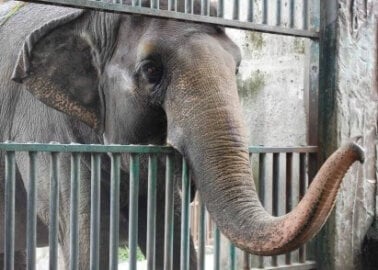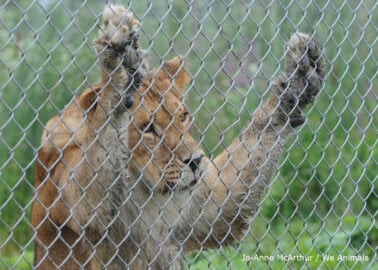Gorilla Who Escaped London Zoo Enclosure Has Been Returned to His Unhappy Life in Captivity
Last night, Kumbuka, a male silverback gorilla, sparked an emergency when he escaped from his enclosure at London Zoo.
Gorilla Kumbuka attacks window at London Zoo seconds before smashing the glass and escaping …until he was tracked down by armed police. pic.twitter.com/cbnrukOhrD
— Nepareizais (@Nepareizais) October 13, 2016
Visitors to the zoo were told to seek safety in nearby buildings as staff armed with tranquiliser darts pursued the animal and eventually tranquilised him and returned him to his enclosure.
It’s a huge relief that, on this occasion, the incident ended without loss of life and London Zoo acted in a humane way. There are far too many stories about animals who’ve tried to escape from a life of stress and frustration in captivity and been instantly shot. And everyone still remembers the heart-breaking story of Harambe, the gorilla who was killed at Cincinnati Zoo after a child entered his enclosure.
But for Kumbuka, the miserable circumstances that probably prompted him to try and escape in the first place remain unchanged. He will almost certainly spend the rest of his days in confinement, being gawked at by a constant stream of visitors, and having every aspect of his life controlled by humans.
Just like humans, other animals long for freedom. Apparently this isn’t the first time that Kumbuka tried to get out. Earlier in the day, he was reportedly seen throwing himself against the window of his enclosure, and one zoo employee admitted, “He’s smashed the enclosure glass a couple of times.” Erratic, repetitive or self-destructive behaviour is common among animals in zoos, as a reaction to the boredom and frustration of being locked up.
London Zoo has serious questions to answer about how it was possible for an animal to escape from its supposedly state-of-the-art £5 million gorilla enclosure. But the biggest question is why are these complex, intelligent animals still being kept captive, when it’s obvious that doing so involves major safety risks, as well as causing misery to the animals themselves?
We need to stop paying to see unhappy animals in captivity and instead work on solutions to help them thrive in their natural environments. Please help – don’t ever visit a zoo.



